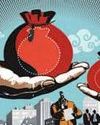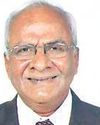In Reichstag elections the previous month, the party had seen a 25 per cent drop in votes despite an expensive and intensive campaign. Gregor Strasser, "chief operating officer" of the National Socialist movement, had exited the party over ideological differences and Hitler's refusal to compromise chancellorship claims, threatening a split in the party.
Though the Nazi Party was the largest party in the Reichstag with 196 seats, business donors, such as steel magnate Thyssen, the Krupp engineering empire and piano maker Bechstein, had tightened the purse strings, repelled by the unhinged violence of the Nazi's storm troopers, the Sturmabteilung (SA). With the party deep in the red, this paramilitary organisation was forced to sell potatoes to covertheir costs; in Berlin 10,000 of them mutinied over shortage of funds.
Yet by January 30, 1933, Adolf Hitler took oath as Chancellor of Germany.Less than two months later he pushed through the infamous Enabling Act, allowing him to issue laws without Parliament's consent, setting Germany on the road to World War II and the Holocaust.
How did the Weimar Republic, united Germany's first genuine democracy, succumb to the Nazis? The standard explanations point to the humiliating terms of the Versailles Treaty imposed by the victorious Allies at the end of World War Ithat irreparably weakened the German economy, causing spiralling inflation and mass unemployment, inevitably enhancing the popularity of right-wing totalitarianism. But Hitler's rise to power was by no means inevitable. Historians tell amore granular story of cynical power broking by the traditional political elite, rooted in Bismarckian privilege with tenuous loyalty to democracy.
هذه القصة مأخوذة من طبعة July 26, 2024 من Business Standard.
ابدأ النسخة التجريبية المجانية من Magzter GOLD لمدة 7 أيام للوصول إلى آلاف القصص المتميزة المنسقة وأكثر من 9,000 مجلة وصحيفة.
بالفعل مشترك ? تسجيل الدخول
هذه القصة مأخوذة من طبعة July 26, 2024 من Business Standard.
ابدأ النسخة التجريبية المجانية من Magzter GOLD لمدة 7 أيام للوصول إلى آلاف القصص المتميزة المنسقة وأكثر من 9,000 مجلة وصحيفة.
بالفعل مشترك? تسجيل الدخول
Laxmi Dental gains over 28% on debut
The stock of Laxmi Dental posted a value jump of nearly 30 per cent during its trading debut on Monday.

Hedge fund managers keep nearly half of profit as fees
Hedge funds have long been regarded as notoriously expensive. New research reveals just how costly they truly are for their clients.

NCLT orders liquidation of Go First
The National Company Law Tribunal (NCLT) on Monday ordered the liquidation of low-cost carrier Go First on the request of its Committee of Creditors (CoC), thus bringing an end to the 20-month-long insolvency proceedings.
The automotive frontier
India needs investment in the EV segment

Anatomy of a regulator
Regulatory bodies are important institutions in a market economy, requiring careful handling

Joining the dots on infrastructure
Pratap Padode is a financial journalist and publisher of Construction Update, a magazine launched in 1996, followed by Infrastructure Today, Power Today and Project Reporter.

The need of the hour is a 'Dream Budget'
In less than two weeks, the finance minister will present the Union Budget for 2025-26.
Focus on Davos
States must improve ease of doing business

Clarity needed on Rodtep scheme extension for EOU/SEZ/AA exports
We had supplied our manufactured goods to a merchant exporter on payment of 0.1 per cent IGST under the notification 41/2017-IT(Rate) dated 13th October 2017.

'Lodha' brand triggers tussle amid brothers
Abhishek Lodha has approached the Bombay HC seeking to stop Abhinandan from using the name
